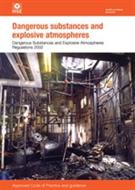Dangerous Substances And Explosive Atmospheres, L138
Dangerous Substances and Explosive Atmospheres Regulations 2002. Approved Code of Practice and Guidance, L138
- Author:
- Health and Safety Executive (HSE)
- Publisher:
- HSE Books

This Approved Code of Practice (ACOP) and guidance provide practical advice on how to comply with the Dangerous Substances and Explosive Atmospheres Regulations 2002 (DSEAR). These Regulations require the elimination or reduction of risk of fire and explosion from substances connected with work activities.
Key features:
The ACOP is primarily for an informed and experienced audience such as health and safety professionals. The leaflet Controlling fire and explosion risks in the workplace INDG370 provides a short guide to DSEAR for small and medium-sized businesses.
The ACOP applies to workplaces that manufacture, store, process or use dangerous substances as defined in this publication.
While Unloading petrol from road tankers L133 remains as a separate ACOP, this second edition of L138 incorporates the following ACOPs, which have now been withdrawn:
-
L134 Design of plant, equipment and workplaces
-
L135 Storage of dangerous substances
-
L136 Control and mitigation measures
-
L137 Safe maintenance, repair and cleaning procedures
The consolidated ACOP text and guidance have been clarified, simplified, streamlined and restructured to help the reader. The content has been updated in light of changes to European and domestic legislation, such as substance classification and labelling issues and general fire safety. No significant new duties are placed on businesses that are already in compliance with the replaced ACOPs. The Regulations themselves are unchanged. The text of the 2002 Regulations is reproduced in a more up-to-date practical form rather than as in the 2002 statutory instrument.
| Extent | N/A | ISBN | 9780717666164 |
|---|---|---|---|
| Size | N/A | Price | £22.88 |
| Format | Paperback | Published | 01 Dec 2013 |
| Availability | In Stock: 1 - 2 days
|
Delivery | Delivery options and charges |




